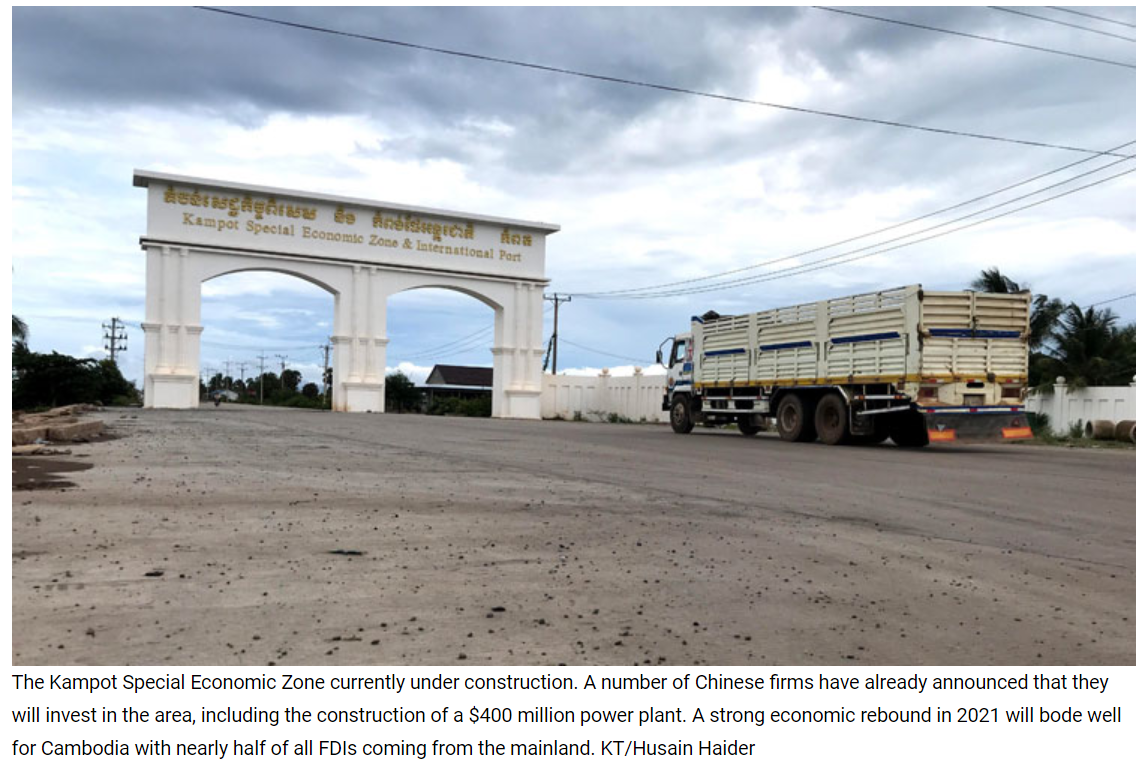Cambodia: Economic recovery linked to Chinese development
With China’s development projected to drive regional growth this year, Cambodia’s post-pandemic recovery continues to hinge on its continued partnership with the world’s second-largest economy, according to experts.
Global foreign direct investment (FDIs) fell by 48 percent to $846 billion last year –its lowest level since 2015, according to Organisation for Economic Co-operation and Development data.
FDIs account for 13.5 percent of Cambodia’s gross domestic product. Inflow from the mainland was valued at approximately $860 million last year – down from $3.6 billion in 2019, according to previously reported figures.
“Regional growth in Southeast Asia, especially in light of tensions in US-China relations will be heavily dependent on how well China recovers this year. As the largest emerging market in the region, it is likely that countries such as Cambodia, which are dependent on Chinese investments and trade, will look to their closest regional power for support coming out of the pandemic,” Bradley Parks, executive director of AidData, told Khmer Times.
Parks and his colleagues from The College of William & Mary in Williamsburg, Virginia, in the US, developed the nonprofit organisation to make Chinese development aid data publicly available.
“China suffers from domestic overproduction of industrial inputs – such as aluminium, cement, glass, iron, steel and timber – because many of its state-owned companies are over-leveraged, inefficient and unprofitable. The authorities in Beijing understand that if these companies cannot find buyers for their excess production, they are more likely to default on their loans and shutter their factories, thereby creating higher levels of unemployment,” Parks said.
He added that the economic rebound, particularly in the Kingdom’s manufacturing and construction sector, may end up benefiting from the oversupply of Chinese construction materials and may result in increased FDI to compensate.
The Kingdom has experienced a rapid period of industrialisation over the last decade.
National Bank of Cambodia (NBC) data shows that the export of electrical machinery and vehicles overtook more agrarian products such as rubber and fish between 2010 and 2018.
FDI in industries such as machinery and equipment over a 15-year period went from negligible to $407 million, according to data.
“Cambodia’s economic structure has undergone a gradual industrialisation process from agriculture-based to more industry-oriented as a result of the government’s economic liberalisation policy. Exports of industrial products largely contribute to the country’s high growth and industrial development,” Maria Yang, author of an NBC report on Cambodia’s export diversification, wrote.
However, with the Kingdom instituting travel restrictions, lockdowns after the Feb 20 event and only recently re-issuing visas for visitors, FDIs are unlikely to return to pre-pandemic levels until travel returns to normal, according to The Wall Street Journal.
The Feb 20 event refers to the date four Chinese nationals bribed their way out of quarantine at a Phnom Penh hotel and went clubbing. Two of them suffered from Covid-19, subsequently infecting more than 25,000 people.
The Ministry of Health reported on Monday that about 23 percent of the population had been inoculated with at least one dose of a Covid-19 vaccine.
By contrast, approximately 39.5 percent of the US population is fully inoculated, according to data from Johns Hopkins University in the US.
Source: https://www.khmertimeskh.com/50863169/economic-recovery-linked-to-chinese-development/


 Thailand
Thailand




